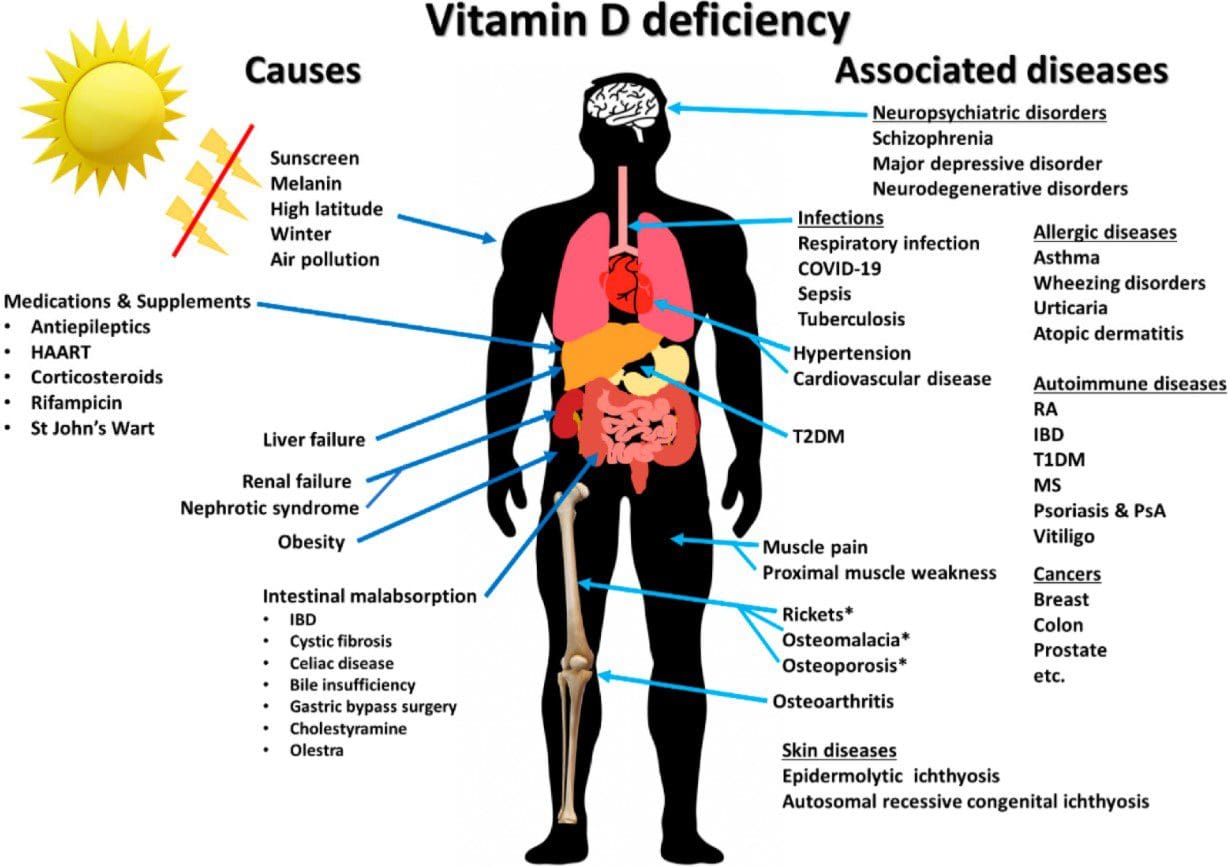
Table of Contents
Vitamin D
Vitamin D is a fat-soluble vitamin and hormone-type compound that has multiple functions in the body. Low vitamin D levels have been identified as a risk factor and associated with chronic diseases that include:- Osteoporosis
- Fractures
- Autoimmune disorders
- Upper respiratory infections
- Rickets and asthma in children
Vitamin Supplementation Can Help
The vitamin has been proven to:- Promote skeletal muscle metabolism
- Improve bone health
- Maintain immune function
- Reduce risk factors for certain cancers

Supplements
Taking a daily vitamin D supplement, within recommended dosages has a low risk for any side effects. Consult a doctor first and ask for a test to determine vitamin D levels. This will verify if there is a deficiency and how much vitamin D is needed each day. Getting vitamin D into the system is most common with increased sunlight exposure. But this might not be an option for certain individuals, depending on the time of year and location. This is where supplements come in. There is not a one-size-fits-all dosage recommendation. Proper dosage depends on individual baseline vitamin D levels. In general, the recommended dietary allowance for vitamin D is 600 International Units or IU’s per day. But in certain situations, like getting older or for individuals that live where there is not a whole lot of sunlight, then a higher intake of 700 to 2,000 IU’s per day could be required to improve vitamin D insufficiency.
Side Effects
With supplements, there is the potential for side effects when taking vitamin D. Vitamin D can become toxic if taken in excess. This is why it is important to get checked/tested or consult with a physician prior to supplementation. Side effects can include:- Fatigue
- Nausea
- Vomiting
- Poor appetite
- Constipation
- Weakness
- Heart rhythm problems
Continued Research
Additional studies are being done concerning vitamin D. Evidence supports the direct benefits of vitamin D supplementation to maintain optimal levels and for overall health.Body Composition
Basic Keto Diet
Going keto means no carbohydrates, as it is a high fat, moderate protein, and very low carb diet. Diets that follow or are based on the ketogenic diet include:- South Beach diet
- Atkins diet
- Modified Paleo diet
- Other low-carb diets
- Meats like pork, chicken, and beef
- Vegans will switch to vegetable protein sources
- Nuts
- Seeds
- Eggs
- High-fat dairy products like cream, whole butter, and hard cheeses
- Leafy greens
- Fish and seafood
- Olive oil
- Coconut oil
- Pure butter
- Vegetable oils rich in omega 3
Foods to Avoid:
- Any foods that are made of starch even whole grain, and organic bread/s
- Fruits that are high in sugar
- Any food that is labeled low-fat
- Vegetable oils that are rich in omega-6 and low in omega-3
Disclaimer
The information herein is not intended to replace a one-on-one relationship with a qualified health care professional, licensed physician, and is not medical advice. We encourage you to make your own health care decisions based on your research and partnership with a qualified health care professional. Our information scope is limited to chiropractic, musculoskeletal, physical medicines, wellness, sensitive health issues, functional medicine articles, topics, and discussions. We provide and present clinical collaboration with specialists from a wide array of disciplines. Each specialist is governed by their professional scope of practice and their jurisdiction of licensure. We use functional health & wellness protocols to treat and support care for the musculoskeletal system’s injuries or disorders. Our videos, posts, topics, subjects, and insights cover clinical matters, issues, and topics that relate to and support, directly or indirectly, our clinical scope of practice.* Our office has made a reasonable attempt to provide supportive citations and has identified the relevant research study or studies supporting our posts. We provide copies of supporting research studies available to regulatory boards and the public upon request. We understand that we cover matters that require an additional explanation of how it may assist in a particular care plan or treatment protocol; therefore, to further discuss the subject matter above, please feel free to ask Dr. Alex Jimenez or contact us at 915-850-0900. Dr. Alex Jimenez DC, MSACP, CCST, IFMCP, CIFM, CTG* email: [email protected] phone: 915-850-0900 Licensed in Texas & New MexicoReferences
Intro: The Journal of Nutrition. (April 1996) “Vitamin D and Bone Healthâ€Â https://academic.oup.com/jn/article/126/suppl_4/1159S/4724783?login=true Intro: European Journal of Clinical Nutrition. (May 2020) “Perspective: improving vitamin D status in the management of COVID-19â€Â https://www.nature.com/articles/s41430-020-0661-0?fbclid=IwAR3yo41dvfU1HWVX_Y6z7iXFNL3X2C06A5gIfC4LcNmXzCA48A7ViMAf7N8 Intro: International Journal of Rheumatic Diseases. (August 2010) “Association between nonspecific skeletal pain and vitamin D deficiencyâ€Â https://onlinelibrary.wiley.com/doi/abs/10.1111/j.1756-185X.2010.01561.xPost Disclaimer
Professional Scope of Practice *
The information herein on "Vitamin D For Bone Health and Injury Prevention" is not intended to replace a one-on-one relationship with a qualified health care professional or licensed physician and is not medical advice. We encourage you to make healthcare decisions based on your research and partnership with a qualified healthcare professional.
Blog Information & Scope Discussions
Welcome to El Paso's Premier Wellness, Personal Injury Care Clinic & Wellness Blog, where Dr. Alex Jimenez, DC, FNP-C, a Multi-State board-certified Family Practice Nurse Practitioner (FNP-BC) and Chiropractor (DC), presents insights on how our multidisciplinary team is dedicated to holistic healing and personalized care. Our practice aligns with evidence-based treatment protocols inspired by integrative medicine principles, similar to those on this site and our family practice-based chiromed.com site, and focuses on restoring health naturally for patients of all ages.
Our areas of multidisciplinary practice include Wellness & Nutrition, Chronic Pain, Personal Injury, Auto Accident Care, Work Injuries, Back Injury, Low Back Pain, Neck Pain, Migraine Headaches, Sports Injuries, Severe Sciatica, Scoliosis, Complex Herniated Discs, Fibromyalgia, Chronic Pain, Complex Injuries, Stress Management, Functional Medicine Treatments, and in-scope care protocols.
Our information scope is multidisciplinary, focusing on musculoskeletal and physical medicine, wellness, contributing etiological viscerosomatic disturbances within clinical presentations, associated somato-visceral reflex clinical dynamics, subluxation complexes, sensitive health issues, and functional medicine articles, topics, and discussions.
We provide and present clinical collaboration with specialists from various disciplines. Each specialist is governed by their professional scope of practice and their jurisdiction of licensure. We use functional health & wellness protocols to treat and support care for musculoskeletal injuries or disorders.
Our videos, posts, topics, and insights address clinical matters and issues that are directly or indirectly related to our clinical scope of practice.
Our office has made a reasonable effort to provide supportive citations and has identified relevant research studies that support our posts. We provide copies of supporting research studies upon request to regulatory boards and the public.
We understand that we cover matters that require an additional explanation of how they may assist in a particular care plan or treatment protocol; therefore, to discuss the subject matter above further, please feel free to ask Dr. Alex Jimenez, DC, APRN, FNP-BC, or contact us at 915-850-0900.
We are here to help you and your family.
Blessings
Dr. Alex Jimenez DC, MSACP, APRN, FNP-BC*, CCST, IFMCP, CFMP, ATN
email: [email protected]
Multidisciplinary Licensing & Board Certifications:
Licensed as a Doctor of Chiropractic (DC) in Texas & New Mexico*
Texas DC License #: TX5807, Verified: TX5807
New Mexico DC License #: NM-DC2182, Verified: NM-DC2182
Multi-State Advanced Practice Registered Nurse (APRN*) in Texas & Multi-States
Multi-state Compact APRN License by Endorsement (42 States)
Texas APRN License #: 1191402, Verified: 1191402 *
Florida APRN License #: 11043890, Verified: APRN11043890 *
Colorado License #: C-APN.0105610-C-NP, Verified: C-APN.0105610-C-NP
New York License #: N25929, Verified N25929
License Verification Link: Nursys License Verifier
* Prescriptive Authority Authorized
ANCC FNP-BC: Board Certified Nurse Practitioner*
Compact Status: Multi-State License: Authorized to Practice in 40 States*
Graduate with Honors: ICHS: MSN-FNP (Family Nurse Practitioner Program)
Degree Granted. Master's in Family Practice MSN Diploma (Cum Laude)
Dr. Alex Jimenez, DC, APRN, FNP-BC*, CFMP, IFMCP, ATN, CCST
My Digital Business Card
Licenses and Board Certifications:
DC: Doctor of Chiropractic
APRNP: Advanced Practice Registered Nurse
FNP-BC: Family Practice Specialization (Multi-State Board Certified)
RN: Registered Nurse (Multi-State Compact License)
CFMP: Certified Functional Medicine Provider
MSN-FNP: Master of Science in Family Practice Medicine
MSACP: Master of Science in Advanced Clinical Practice
IFMCP: Institute of Functional Medicine
CCST: Certified Chiropractic Spinal Trauma
ATN: Advanced Translational Neutrogenomics
Memberships & Associations:
TCA: Texas Chiropractic Association: Member ID: 104311
AANP: American Association of Nurse Practitioners: Member ID: 2198960
ANA: American Nurse Association: Member ID: 06458222 (District TX01)
TNA: Texas Nurse Association: Member ID: 06458222
NPI: 1205907805
| Primary Taxonomy | Selected Taxonomy | State | License Number |
|---|---|---|---|
| No | 111N00000X - Chiropractor | NM | DC2182 |
| Yes | 111N00000X - Chiropractor | TX | DC5807 |
| Yes | 363LF0000X - Nurse Practitioner - Family | TX | 1191402 |
| Yes | 363LF0000X - Nurse Practitioner - Family | FL | 11043890 |
| Yes | 363LF0000X - Nurse Practitioner - Family | CO | C-APN.0105610-C-NP |
| Yes | 363LF0000X - Nurse Practitioner - Family | NY | N25929 |
Dr. Alex Jimenez, DC, APRN, FNP-BC*, CFMP, IFMCP, ATN, CCST
My Digital Business Card





 Again, We Welcome You.
Again, We Welcome You.
Comments are closed.